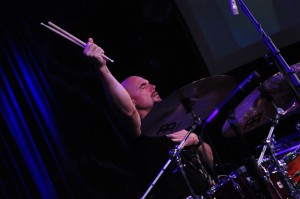
Deep worship w/ Paul Baloche Band
Ah, yes,,, another seminar and concert event has finished. Great teaching sessions and nights of worship have been followed with many discussions about technical & spiritual matters. Questions about how to tune the drums or what equipment do I prefer are fairly common. Also comments about how certain songs touched people or the positive team spirit of the band are heard. But the most popular topic here, by far, is the “busy drummer syndrome.” This doesn’t mean keeping the calendar full of appointments either. No, sadly, I frequently talk with worship leaders, music directors, and other musicians about their drummers “over-playing.”
OK, drummers, here’s the deal! Most people don’t want to hear a fill every two bars. They don’t care how hard you’ve practiced to play those 32nd note patterns or to “nail” the solo from your favorite drum recording.
They just want you to PLAY THE SONG! Keep the tempo steady, and play the tune the way you hear it on the recording, AND THAT’S IT! **The bold letters mean that I’m shouting… Oh, I’m sorry,,, I mean,,, speaking with a strong emphasis. Actually, I’d pull my hair out except that I shave my head now and have nothing left to grab. Why is it that so many drummers don’t get this? … It is a mystery.
You may have heard me say this before but it’s worth repeating. I always tell my students and clinic attendees to “Play music, NOT drums.” Serving the song and your team is your primary objective. If you think those things are suppose to serve you and give you a way to show-off your “sweet drumming skills” you’ve got it all wrong. Gosh!!!
Now I know I’m making a big deal out of this, but it IS a big deal. Making the song sound great is EVERY musician’s job. If that is your heart about being a drummer people will love your playing. If the music calls for a lot of activity then go for it… but if it’s just playing grooves for tunes, then master that skill as well.
Every great drum icon I’ve seen & heard made the whole band sound fantastic. Especially working with singer/artist types they always play for the song, and it is a magical experience. Drummers often think that their drum hero must be very restrained in their ability to just play songs. “They must be bored out of their mind! … I wish they could really cut loose!” But, you know, the “regular” people listening never think of it like that. The non-musical folks are just enjoying and experiencing the music.
So, how do you keep from falling into the “busy drummer syndrome?” The first thing I do is just copy what has already been done. Listen to the original recordings and just do what they do. It’s that simple. And yes, SIMPLE is usually the operative word. Most songs are arranged very carefully. Check out any of your favorite artists or worship recordings and you’ll hear what I mean. Intros, verses, choruses, etc. etc. all seem to have specific musical ideas happening. Play it just like that.
Yea, I know, you’re thinking… “But Carl, that’s sooooooo boring!!
I want to add some flash to it; put some of my own personality into it! Man, I’ve got to express myself!” Arghhhhhhhhh! Get over this attitude as soon as possible. Express yourself at home! Blow off that creative drive during your practice time. Otherwise, just play the songs.
Doing a great job IS expressing yourself. It is the most mature thing you can do as a musician. Making great music and bringing the songs to life is what it’s all about. There is not one artist that I’ve worked with that doesn’t feel the same way about this subject.
Another way to battle this illness is to talk to your worship leader or music director and ask if what you’re playing is working for them. If you’ve started with the recording as your reference they’ll usually like what you are doing. But there are times they do want a little more activity just to add energy to certain songs. Don’t get carried away though. This is not permission for you to become a “drum monster.” (You know, the big creature stepping on everything that gets in its way.) Yes, you must ask them. Sometimes people are afraid to talk to you about your playing because everyone knows how sensitive musicians can be.
Recording your rehearsals and performances is also a great tool. Video tape it if you can, but do something so you can go back and check out how it went. Be honest with yourself and make note of both your great and bad moments. Let others review your recording as well. Then change anything you need to in order to make your performance even better.
Finally, practice groove ideas with a click track for eight bars without any changes. Only do fills at the end of an eight bar phrase, and then maybe go to a variation of the groove for the next section. Do not even do fills in the 4th measure. This is an exercise in restraint. Not physically difficult, but it can be a real mental challenge. Do it! Listen closely to how consistent you are with EVERY element of your playing. Do the snare hits sound exactly alike? Is your hi-hat pattern maintaining a steady pace? Does the bass drum perfectly line up with your hands and sound solid? Put your playing “under the microscope” and perfect every element to the best of your ability.
OK, so you say you’ve heard it all before.— Great. — BUT,,, are you doing it? Are you really honing in on your musical artistry? Do not become complacent or rest on yesterday’s accomplishments. Keep moving ahead. Improve what talent you already have.
1. Copy the drummers on great recordings.
2. Ask for honest feedback from those you work with.
3. Record yourself all of the time and review it.
4. Practice the 8 bar phrase concept with a click.
Playing simple great grooves is NOT as simple you may think. It takes a strong, mature player to do this. But the pay-off is amazing. The whole band is going to sound better. Your singers are going to love how open and spacious the tunes feel. And you should feel more confident and solid in your performance.
Again, remember it’s all about the music. Play what’s right for the style of songs your doing and you’ll be honored amongst your peers.
“PLAY MUSIC, NOT JUST DRUMS.”
Blessings,
Carl

 BECAUSE OF MY RECENT TEACHING EXPERIENCES I’M POSTING THIS AGAIN. EVERYONE SHOULD BE ABLE TO PLAY TO THE CLICK. HERE’S HOW…
BECAUSE OF MY RECENT TEACHING EXPERIENCES I’M POSTING THIS AGAIN. EVERYONE SHOULD BE ABLE TO PLAY TO THE CLICK. HERE’S HOW…






Recent Comments